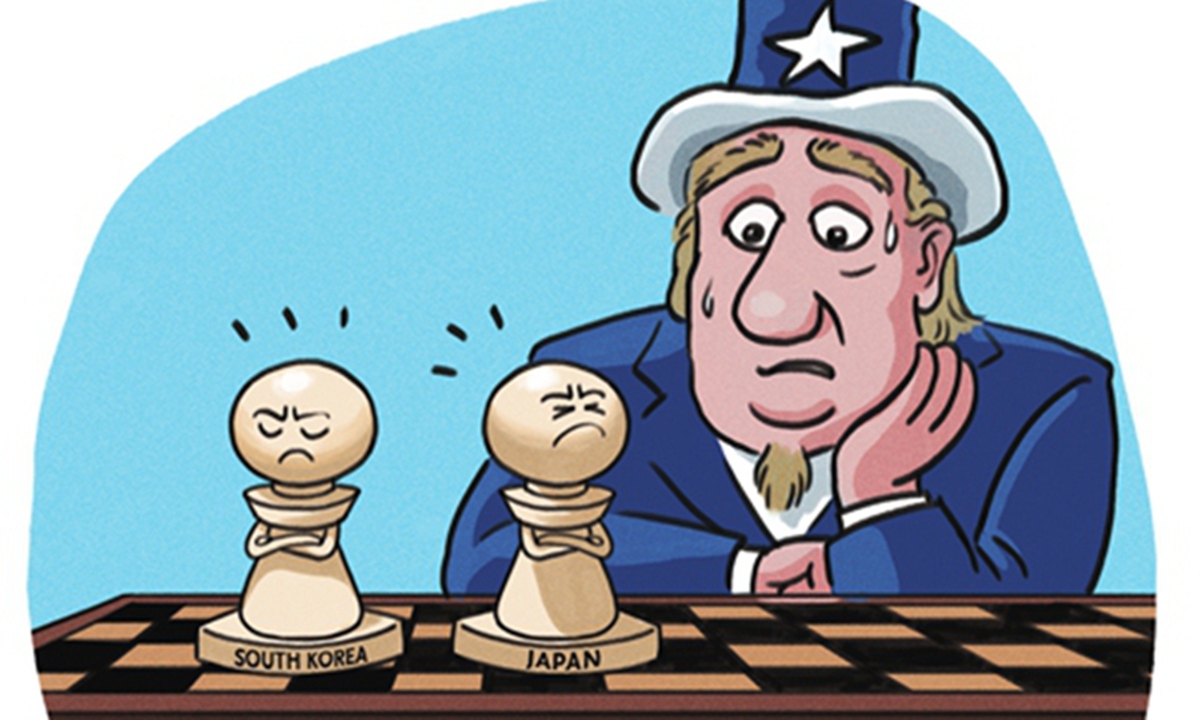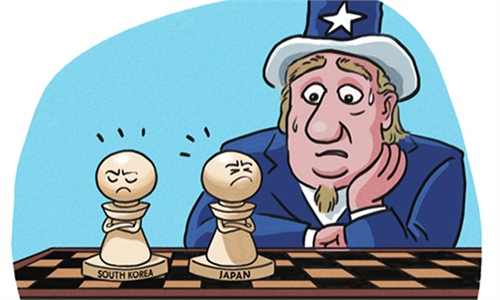
llustration: Liu Rui/GT
On Friday US time, US President Joe Biden will host Japanese Prime Minister Fumio Kishida and South Korean President Yoon Suk-yeol for a trilateral leaders' summit at Camp David, near Washington.On Monday, Axios, a US news website, noted that the three countries will announce joint military exercises and a possible new crisis hotline between the three allies. There's more. As soon as the summit was announced in late July, media reports said that at the meeting, the three leaders are anticipated to agree to start sharing information on North Korean missiles at an early date, and discuss strengthening deterrence provided by the US, including the nuclear umbrella. But the tendency will not only fail to contribute to the peace process on the peninsula but also exacerbate the risk of bloc confrontation and undermine peace and stability of Northeast Asia.
Camp David, a rural retreat of US presidents in Catoctin Mountain Park, often witness high-ranking US government officials discussing significant policies or hosts important foreign guests. This upcoming summit marks the first time that Biden has invited foreign leaders to Camp David since assuming the US presidency. The high-profile reception of Kishida and Yoon demonstrates US' emphasis on the trilateral relationship and aims to showcase a united small group of the US, Japan and South Korea to the international community.
On Tuesday, Reuters reported that the summit is anticipated to lead to a joint statement that "includes some language speaking to concerns about China's desire to change the status of self-governed Taiwan, which it claims as its own territory." This is a typical way of the US to bring in its allies and gang up and pile pressure on China. This only proves that the US is the biggest threat to peace and stability in the Taiwan Straits, by constantly stirring up troubles in the waters.
In essense, the summit can be viewed as a channel to implicitly promote the creation of a "mini-NATO" in Northeast Asia, based on alliances with Japan and South Korea. The US has long intended to legitimize its involvement in regional affairs and counter both North Korea and China. But due to historical grudges and current disputes between Tokyo and Seoul, as well as their different security perceptions and interests regarding Beijing, Washington's strategic goal has been difficult to realize.
However, with the improvement of the Japan-South Korea relations, the Kishida administration's description of China as an "unprecedented strategic challenge," significant adjustments in South Korea's diplomacy toward the US and China under the Yoon administration and missile launches by North Korea this year, the US once again sees the possibility of promoting the construction of a "mini-NATO" in Northeast Asia.
On August 10, US Ambassador to Japan Rahm Emanuel revealed the plan to hold regular trilateral meetings among the three countries. Given that US' "mini-NATO" strategy often faces setbacks resulting from tensions between Japan and South Korea, it's evident that the Biden administration aims to indirectly forge a "quasi-alliance" between its two allies, through this summit meeting mechanism.
Under the guise of countering the "threat" from North Korea, the US, Japan and South Korea have been continuing to strengthen their trilateral military cooperation. But it does not contribute to regional peace and stability. This approach will only provoke North Korea and exacerbate tension on the Korean Peninsula, making the denuclearization of the peninsula and the establishment of future peace mechanisms even more challenging. Simultaneously, under US' indulgence, Japan and South Korea are vigorously bolstering their military buildups which in turn trigger heightened vigilance among other regional countries, leading to a fresh round of regional arms race. Consequently, this situation will worsen the geopolitical security environment around Northeast Asia and further upsets the delicate balance of security in a wider region.
Driven by the Cold War mentality and ideological confrontation, the US has been maintaining a military presence in Northeast Asia for a long time and has been increasing its military investment there, attempting to control the dominant position in the region's military confrontation. Some politicians in Japan and South Korea, motivated by their own interests, are dancing to the US' tune and willingly acting as pawns for the US. However, intensifying military cooperation among the US, Japan and South Korea will only bring about bloc confrontation and regional division, disrupting security and development in Northeast Asia. Northeast Asia is a grand stage for collaborative development, not an arena for competition. Any action by the US, Japan and South Korea will leave footnotes in history. Therefore, it is strongly advised that the three countries act with caution.
The author is a guest research fellow at the Centre for Japanese Studies, Liaoning University. opinion@globaltimes.com.cn

